spiritual questions and answers PART 14 By Prof. G. Venkataraman |
||
Since Heart2Heart started in 2003, readers have very often written to us seeking answers to many spiritual questions. We have answered them at times through appropriate articles in H2H. However, there are still many that have to be explained carefully and in detail. And in the recent past, a lot more queries have arrived on varied topics concerning spirituality and personal growth.
We have now meticulously compiled and categorised these questions, and Prof. G. Venkataraman has offered to answer all these queries in a structured and systematic way as a series on Radio Sai as well as in H2H. In this way, these answers now remain always on our website as a ready reckoner on spiritual doubts. This is a suitably adapted transcript of our radio series bearing the same name.
Loving Sai Ram and greetings from Prashanti Nilayam.
In this episode, we shall deal with a new topic called the Five D’s, to which Swami often makes frequent references. The five D’s are: Discipline, Devotion, Dedication, Determination and Discrimination. The order in which these are referred to tend to vary, but that is not important since all these virtues are related.
There are five questions we have received under this heading, and in this article I shall try to deal with two. The questions are:
QUESTION 1: How do we develop Discrimination?
QUESTION 2: How can we maintain Discipline, Dedication, Determination and Discrimination?
As you can see, the first question is only about Discrimination, while the second question illustrates how these five D’s are interlinked. Let me start with the first question, How do we develop Discrimination? To answer this we must first ask what exactly is meant by Discrimination. The simple meaning of course is that it refers to the ability to distinguish between different options. I shall first explain how this operates in the worldly sense.
 |
Let us say one is trying to buy a house and there are several options. The houses are all within a price range that the buyer can afford, but they are in different places, and have various advantages as well as disadvantages. In such a circumstance, the buyer would clearly weigh all options and come to what we would call an optimal decision, where all factors are properly balanced – we are well very familiar with this kind of a situation. In this and similar cases, the word discrimination means weighing all the pros and cons associated with the different options and making a logical and optimal choice. I hope this is clear.
In our case, the question is not about worldly discrimination, but Spiritual Discrimination, although the questioner does not state that explicitly. In Spirituality, the question of Discrimination arises when one has to perform some action. Action, we should realise, is in the world and relates to circumstances that mostly concern the world. However, when the action is actually performed, one has to keep in mind considerations that go far beyond merely worldly considerations. That is where the question of Spiritual Discrimination assumes great importance.
 |
The question now becomes: “What exactly does one mean by saying that one must go beyond mere worldly considerations?” There are many ways of answering this question but I shall do so by referring to the Purpose of Life, to which I believe I have made numerous references in earlier talks in this series. Remember what the Purpose of Life is? As Swami describes it: From God we all have come and to God we must return. In other words, any action we perform must be consistent with the Purpose of Life, that is to say, must be consistent with our goal of going back to God.
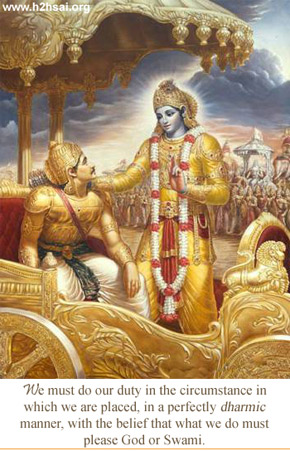 |
|
Quite possibly, all those words may not mean much to you; so maybe I should explain by offering an example. The first example I shall give goes all the way back to the Gita, for it is truly a classic example. It is the first day of the great Kurukshetra War; the battle is about to begin, when Arjuna tells Krishna that he does not want to fight. Why?
Because he says fighting means he may have to kill his Guru and his beloved grandfather Bhishma. Krishna chides Arjuna and then teaches him the Gita. What is the essential message of the Gita?
It is that we must do our duty in the circumstance in which we are placed, but in a perfectly Dharmic manner, that is to say, with the belief that what we do must please
God or Swami.
Krishna tells Arjuna that this war was not just one between the Kauravas and the Pandavas but between the forces of Adharma (unrighteousness) and the forces of Dharma (righteousness).
Under the circumstances, since Arjuna was with Team Dharma, he had no business to quit. Adherence to Dharma overrides all bodily considerations. And Arjuna’s objections to fighting were all based on this flawed argument. Remember, he tried to quit by saying Bhishma is my beloved grandfather, etc. That was a mistake, and what Krishna did was to correct that mistake by teaching Arjuna the Gita.
A second example that I wish recall concerns a question I posed many years ago during a workout session for students in the course of a Summer Course in Brindavan, which I believe was in 1994. I said: “A speeding truck knocks down a man who is badly wounded and is bleeding heavily. Unless the man is immediately moved to a hospital and given emergency treatment, he would die. But there is a hitch. The law of the land says that in the event of an accident, nobody should touch anything until the police arrive on the scene. Otherwise, critical evidence might be damaged and even get obliterated – that was the view of law. The question I posed was: ‘What would you do if you were there watching the man being hit and the truck speeding away?’”
 |
All sorts of answers were given, and after a while I asked Mr. Narasimha Murthy, Warden of the Brindavan Hostel, who was one of the panellists to analyse the various responses from the students and give his answer to the question. He said that though the law said nothing should be disturbed until the police arrive, he would nevertheless rush the injured man immediately to the hospital. He added that saving the man’s life was far more important than observing a man-made law which is defective anyway. By the way, I believe at long last that ancient rule has now been changed for the better.
Swami says, “The Vedas do say revere your father as if he is verily God; see God in him and obey him. Yes, the Vedas do say that, but do not the Vedas also declare that God is the Supreme Being? |
Going back to Mr. Narasimha Murthy, he added that by acting the way he said he would, he would be conforming to Atma Dharma (Fundamental Discrimination) which is central to the Gita. If man-made rules had to be broken in the process, that was a pity, but for humans Atma Dharma always came first, never second – that was Narasimha Murthy’s emphatic response, and he was 100 % correct.
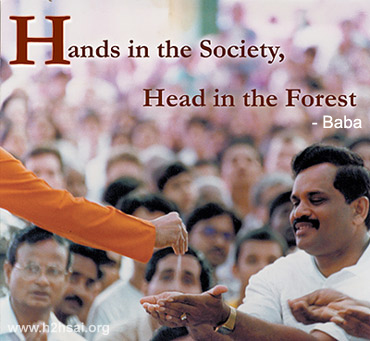 |
|
I can go on and on, but shall not because I have actually dealt with the issue of Atma Dharma extensively in a special series on the Gita that I gave sometime ago over Radio Sai. Since further details are available there, I shall wind up by recalling what Swami says in His Gitavahini.
He says that while action must necessarily be always in this world and obviously must be in relation to worldly circumstances that necessitate the action, it must invariably be based on Eternal considerations.
To put it more crisply, the fundamental principle guiding all actions must be: Act in the world, but always keeping God in view, and in accordance with His commands. In case that is still not clear, let me give another example that really should wipe out all doubts.
Go back to the famous story of Prahalada to which Swami often makes a reference. There was this five-year old kid who was asked to worship his father as the ultimate. However, Prahalada refused to do this, saying while he had enormous respect for his bodily father, he could not accept his father’s order to ignore the Real God Almighty and instead regard his bodily father as the Supreme One. Since all of you must be familiar with that story, I shall skip the details and come straight to the point.
You will recall that when Prahalada refused, his father became furious, going to the extent of trying to get rid of his own son. We of course know how the story ended. God eventually manifested, saved Prahalada, annihilated the evil father, and proved to the world that Prahalada was right in holding steadfastly to his faith.
In the context of Prahalada’s refusal to obey his father, the question is often asked: The Vedas declare that ‘father is God’, ‘mother is God’ and so on. By doing what he did, was not Prahalada defying the very Vedas, which one is not supposed to?
 |
|
Swami has given a beautiful clarification, the like of which I have not heard from anyone. Swami says, “The Vedas do say revere your father as if he is verily God; see God in him and obey him. Yes, the Vedas do say that, but do not the Vedas also declare that God is the Supreme Being?
So, if Hiranyakashyapu, the father of Prahalada, claims that there is no God other than him, then he was clearly in defiance of God, the Supreme; and the Vedas certainly do not sanction that. Thus, it was the father who was defying the Vedas rather than the son.
What did Prahalada do? He gave expression to the principle that when it comes to choosing between father and God, it definitely has to be God and none other. In other words, Prahalada was making proper use of Spiritual Discrimination to make a proper choice between the unreal and the Real – that is the point of Prahalada’s story.” That’s what Swami says. If you want it even simpler then here it is [again from Swami]:
If it ever comes to a choice between God and some other person, no matter how close that other person might be to you, always make God as priority ONE!
Keeping that in view, let us consider a few other examples that Swami has given. Consider Bharatha, the brother of Rama. He gave priority to God over his mother Kaikeyi, whose mind had been clouded by the evil advice given to her by her maid servant. Similarly, Emperor Bali chose God over his Guru, Meera chose God over her husband, and so on.
Thus the essence of the advice that Swami gives in the Gitavahini is that our actions, while being performed in the world and based on worldly considerations, must be always guided by Eternal considerations. In simple terms, it all boils down to making God priority number one, always. It may not suit us, but whether we like it or not, that is God’s preference! So please remember what the bottom line is; if we forget it, then we alone are to blame. I hope that is clear.
Let me move on to the next question which is:
How do we maintain Discipline, Dedication, Determination and Discrimination?
I shall try to deal with this question by focussing first on the word “maintain”. In order to maintain something, one must first acquire the thing that is supposed to be maintained – that should be evident. I mean if one has to maintain a car, one must first have a car, must one not? You might wonder what is the big deal in my making such an obvious point? There is a very good reason and let me explain.
Let us not forget that God has given us the human form primarily to use its enormous power and capability for returning to God. |
Let me first point out that in the question as posed, the word Devotion is missing; I shall include that also so that we have the full quota of Five D’s. All these Five D’s we are now discussing are related to Spiritual Purity, which is a must-required qualification if one is trying to transform oneself Spiritually. In other words, before we discuss how we maintain Spiritual Purity, we must consider: How does one achieve Spiritual Purity in the first place?
 |
The first thing to appreciate in this context is that the Mind plays a key role in any attempt to achieve Spiritual Purity. And, any discussion of the Mind must not omit to include the senses along with the Mind. Given the fact that by design the senses are meant to hang around the external world, and the fact that the Mind and senses have a strong coupling when they go out into the world, the senses have a natural tendency to drag the Mind into the world. You might say, “So what? What’s wrong with that? What’s wrong with the world? Did not God create the world?”
These are issues that need to be considered carefully. First and foremost, it is indeed true that God did create everything that is in the Universe. It is equally true, God gave humans a planet that He personally filled with all kinds of goodies like pure air, water, land, wonderful forests, mountains, oceans, and so on; and He gave it all for free. But look at the world as it is today. Who is it that is polluting air, water and land so massively? Who is it that is destroying massive rain forests that act as the planet’s lungs? Who is it that has created literally a multi-trillion dollar industry devoted to gambling, drugs, and catering to sensual pleasures, etc.?
Who is it that in order to amass wealth, has not hesitated from even kidnapping children to offer them for adoption in rich countries? Who is it that is engaged in inhuman trafficking of unsuspecting young women, and so on? And then there are other problems created by mass corruption, illegal trading in dangerous weapons, and so on. The list is huge, and I really do not have to go into all that in pitiless detail.
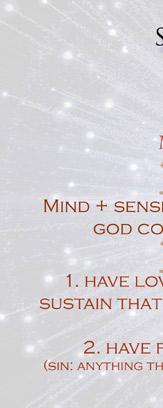 |
 |
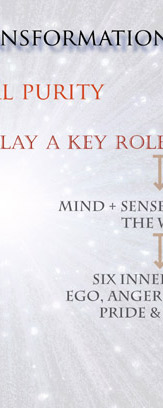 |
 |
If you think carefully about it, it is all the result of the Mind being misled by the senses after being dragged into the world. Once the Mind becomes engrossed in the so-called attractions of the world, the famous enemies of humans, that is to say, Kama (desire), Krodha (anger) and all the rest of them, take over and make the person a slave. Thus it is that people become slaves to drinking, drugs, gambling, greed, anger and so on.
The long and short of it is that the Mind which is meant to dwell upon God as much as possible, hardly finds any time even to remember that there is a God. Indeed, sometimes the Mind tries to dodge the whole issue by simply denying that God exists! What it all boils down to is that before we talk of any maintenance issues, we must first discuss how we turn the Mind away from the useless things of which the world is full, and direct it towards God; I hope you agree.
If we want to make the Mind turn towards God, then there are two very important things we should pay attention to. First and foremost, we should realise that God has given us something that no one else can, namely life. Next, we must appreciate that God has given us all a body with amazing capabilities, and a Mind with astonishing powers. Why has God given us these? So that body and Mind are used for God’s work and not for pandering to the senses.
Let us not forget that God has given us the human form primarily to use its enormous power and capability for returning to God. Remember the Purpose of Life? Well, life and the amazing human form have been given to us for this very purpose. How do I know? Well, that is what Swami tells us via His remark: Jantuunaam narajanman durlabham, meaning that, human birth is rarest of all. And whenever Swami quotes this Sanskrit statement, He then goes on to explain why human birth is so precious and what we are supposed to do with it. But how many of us pay attention to all that? Instead we pull out our memo pads and start scribbling something about meetings to attend, etc., or check for messages on the eternal companion of the 21st century, the Blackberry.
OK, God has given us life and the Mind to fulfil the purpose of life as He has defined it. All that is accepted; but how is it related to the question asked? How do we maintain Devotion, Discipline, etc.? The short answer to that is that we start loving God and sustain that Love non-stop!
 |
 |
 |
 |
The question now becomes: Who can say I do not love God? So many do, but somehow that does not seem to help, and something sure is missing! Come to that point! Fair point and I shall try to deal with that next.
Yes, there does seem to be a problem somewhere, is there not? Let us investigate. To understand what I am going to say, we need to recall two phrases that Swami draws our attention to. They are: 1) Daiva Preethi or Love for God, and 2) Paapa Bheethi or Fear of Sin.
Let me deal with Paapa Bheethi or Fear of Sin; when I do that, the meaning of Daiva Preethi or Love for God would automatically become clear. People say, “Look, we all know about sin and how to avoid it.” Maybe, but let me ask you: “In the ultimate analysis, what exactly is sin? How does one define it?”Most people no doubt have their own definition of sin, often one that suits them. In truth, in the ultimate analysis, sin, especially in the context of what we are discussing, is an act that deflects us from or delays us in achieving the Purpose of Life. If we do anything that delays our journey to God, then it would displease God; thus, sin is really anything that displeases God. Please bear that in Mind.
If we make going back to God the PRIME objective of life, then automatically it becomes clear that the Mind has to be focussed on God rather than allowing it to wander endlessly and extensively in the material world. |
In a recent class, one of my students brought up the case of a leading business tycoon who is loaded with money, and says: “This is my money; I have earned it by hard work, and I pay my taxes. So what is wrong with using my money the way I want? You may not like what I am doing, but that is not my problem.” Let us analyse this man’s remark in the context of what I have been saying.
OK, this man has made money in business and, after paying taxes, has tons of it left. He wants to spend what he calls his money, lots of it, in sheer luxurious living. In the usual worldly terms, he might appear to have the right to do what he wants with his money. But let us look at the issue in larger terms; if we do, then straightaway we see many problems. What does Swami say in His Discourses and in His Dharma Vahini, on which I gave an extended series of talks recently?
He says that our actions, whatever they are, must help others, benefit others, bring at least some joy to others and so on. It is such acts that would please God. Would the manner in which this tycoon wants to spend his money, bring joy or even relief to anyone?
Consider the following fact. During the last three or so years, several thousands of farmers have committed suicide because they could not repay the loans they took. Most of the farmers who committed suicide belonged to the States of Andhra and Maharashtra. I believe the number of suicides exceeds ten thousand. What a massive tragedy!
 |
 |
 |
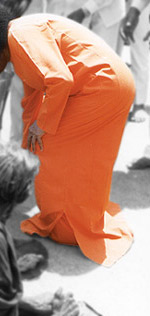 |
Now why did I bring this up? It is for a very important reason. A couple of years ago, when I was listening to a news program from America, I was surprised to hear that news about these suicides appeared in a California radio program or newspaper, I do not remember which. But what was stunning was that many ordinary people living there were so moved by this news that they decided to do something, at least a little bit, so that they could bring some cheer into the lives of the bereaved families. One person who so decided was an airhostess, and she was a Greek immigrant, if I remember right. She saved some money, flew to Hyderabad, sought out one particular family and gave the money she had saved. Another person was a Hispanic, and he too was in some kind of an ordinary job. Yet he too saved money and gave it to a deserving family in far away India.
OK, all this has not really solved the massive problem, but that is not what we are talking about. The point is that if a few loving hearts in far away America could do something, even if it be on a small scale, don’t you think a rich person in India could spend a portion of his huge wealth in bringing some small cheer to so many suffering families, even though he may have the legal right to spend his money the way he wants? I am certain that if he did what I am saying he ought to have done, God would be immensely pleased.
Transformation goes hand in hand with enhancement of Purity. |
Let me connect all this with what I was saying earlier. I told you that to get on to the path to God, we must divert the Mind to God. Now if we say, “I earned this money and so I can do what I want”, etc., it may be legally OK but then, it boils down to seeking pleasures. That is counter to the Purpose of Life, and in that sense, the action would not please God. In short, if we are serious about Spiritual transformation, or achieving Spiritual Purity, then there is no question that the Mind HAS to be diverted to God, not on a part-time basis, but constantly; this constant focus on the goal of life is what maintenance is all about – remember, the question is about maintaining virtues. In the context we are now considering, Paapa Bheethi means not doing anything that would displease God.
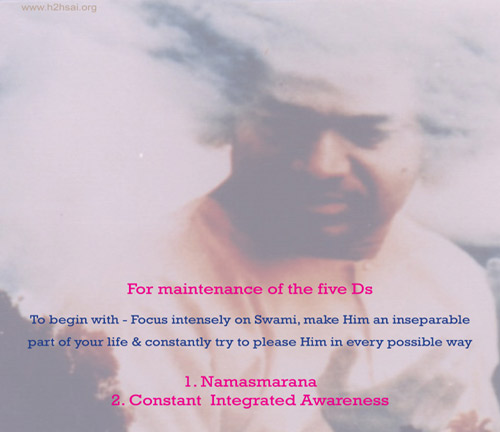 |
People would say: “Be realistic, the latter is not possible.” I would agree that for most people that would certainly be rather difficult though not impossible. But for us who claim to love Swami, it is a different matter. Why? Because we have someone who is visible, someone we can actually relate to in flesh and blood in the same way we relate to, say our father and mother, and that someone is Swami. Thus, when we try to do something that would interfere with transformation, etc., all we have to do is to ask: “Will not Swami be pained by what I am trying to do?” Let us not delude ourselves, arguing how would Swami know? He would know for sure, because He dwells in every single Heart, with no exception. So, there is no escape route there.
After that long preamble, let me now turn to the question proper. What is needed before one begins talking about maintenance is to know how to get started. My suggestion based on Swami’s teachings, is we should focus intensely on Swami, make Him an inseparable part of our life, and constantly try to please Him in every possible way. Incidentally, constant chanting of His Name is the easiest way of making Him an intimate part of our life.
Believe me, Namasmarana is capable of immense help, by helping us to acquire one-pointedness. And this means assigning Swami a much higher priority than worldly things. Determination is more or less the same thing; it means constancy in the attitude that it is always SWAMI FIRST.
 |
|
Col. Hunt of England |
What about Discrimination? In the context of all that I said, Discrimination means the following: It means making the right choice from a Spiritual point of view. That implies being very clear about what the various options, and choosing the option that places Swami first.
Let me at this point stress that Discipline, Dedication, Determination and Discrimination are all essential whenever any specific goal that involves total commitment is concerned. Consider, for example, the conquest of Everest. Today, over a thousand people have climbed to the top of the world, but I still remember vividly the first time the peak was reached, which was in 1953 i believe.
Col. Hunt of England was in charge of that expedition, and he insisted on discipline, dedication and determination. For Col. Hunt, all these virtues were parts of the package of one goal, and that went a long way in making his team do what had never been done before.
In short, if we make going back to God the PRIME objective of life, then automatically it becomes clear that the Mind has to be focussed on God rather than allowing it to wander endlessly and extensively in the material world. If the Mind has to be focussed in that manner, then we obviously have to move away from our current favourites, however much we might argue that they are important, unavoidable, etc.; those excuses cannot wash.
 |
Lofty Mountain Everest |
In other words, Spiritual transformation has to become the name of the game, in which case we have to keep in view the following:
- Transformation goes hand in hand with enhancement of Purity.
- Purity requires that we make a determined effort to keep the Mind focussed on God and deny it all chances to wander in the world aimlessly and recklessly, falling an easy prey to all sort of attractions, which are seriously detrimental to the basic Purpose of Life.
- In this context, the Five D’s as they are called become extremely important.
- Yes, they are tough to hang on to all the time but two things help immensely in doing this. The first is constantly chanting the Name of the Lord; this helps tremendously. The second is what Swami refers to as Constant Integrated Awarenes.
Constant Integrated Awareness
I have thus far not referred to this Constant Integrated Awareness and this is a good time to do so. This CIA, if you permit me to use this abbreviated form of that phrase, means seeing God everywhere, in every thing, and all the time. At first this may seem rather crazy, but in reality, it is not so especially when we consider the positive aspects. Every single day, each one of us gets help in many different ways, and from so many different people. It may not be a big help, but we get it nevertheless. Let me give a personal example.
 |
Way back in early 1955, when I was studying in the Indian Institute of Science in Bangalore, one Sunday morning when I went to see a movie along with two friends, I was hit by a cyclist even as we were all getting down from a bus. I fell down, and suffered a fracture in my left hand. For a moment, I lost consciousness. The two friends who were with me, straightaway took me to a doctor nearby, then arranged for an ambulance to take me to hospital so that I could get first-aid, and so on. It did not end there; I had to make many trips to a big hospital in Cantonment to get x-rays, have a cast put on, and so forth. All this happened because of friends. Much later, I understood it was Swami appearing in the form of those friends who actually helped me.
Over the years I have come to realise that in fact, as Swami often says, He is ever with me, around me and so on, apart from being within and available 24/7. Once this feeling grips you, life can and sure does become different, and from then on practicing CIA did not seem that difficult. I do not claim I am 100% there; far from it; at the same time, I think I can expect at least pass marks! Yes, if we make up our Mind firmly, then dedicating it to God is not as difficult as it is made out to be. That is the sum and substance of maintaining the five virtues described as the Five D’s.
That is all I have time for this time. God bless, Jai Sai Ram.
Dear Reader, how do you like this series? Does it help you in any way? Do you have any spiritual questions which need clarification? Please feel free to write to us at h2h@radiosai.org mentioning your name and country. Thank you for your time.






